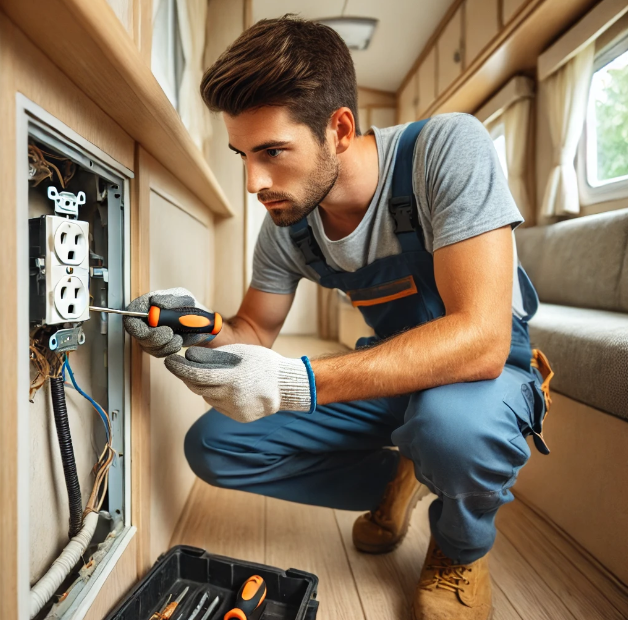Mobile homes are known for their affordability and versatility. However, like any residence, they can encounter electrical issues over time. While mobile home electrical systems follow many of the same principles as traditional homes, they also have unique features and challenges.
Understanding these common mobile home electrical problems and how to address them can save you time, money, and unnecessary frustration. These are the most common mobile home electrical wiring problems, as well as their causes and possible solutions.
Common Mobile Home Electrical Problems
Like regular properties, mobile homes are susceptible to various electrical issues, disrupting daily life if not addressed promptly. Understanding these problems and mobile home electrical troubleshooting can help maintain a safe and functional home.
1. Power Surges
Power surges are sudden spikes in electrical voltage. Surges can damage appliances and electronics that are plugged in during a spike. In mobile homes, these often occur due to lightning strikes, faulty wiring, or overloaded circuits.
Solution: Install a surge protector at the main power source to safeguard the entire home. Individual surge protectors for sensitive electronics, like TVs and computers, provide additional protection. If surges persist, have an electrician inspect the wiring for underlying issues.
2. Loose Outlet Covers
Loose outlet covers may seem like a minor issue, especially for homeowners who can still access the outlet. However, these loose covers expose wires, creating a potential hazard, especially for children or pets. These are typically caused by wear and tear or improper installation.
Solution: Replace or tighten outlet covers using appropriate screws. Ensure the cover is flush with the wall to prevent accidents. If the problem persists, it could indicate loose wiring behind the outlet, which requires professional attention.
3. Powerless Sockets
A socket that suddenly stops working is a common issue in mobile homes. Your appliance may not receive power when plugged in. This could result from a tripped breaker, faulty wiring, or damaged outlets.
Solution: Start by resetting the circuit breaker. If the problem continues, test the socket with a voltage tester. Replace damaged outlets or seek professional help to rewire them if necessary.
4. Exposed Wires
Exposed wires pose a severe safety risk, potentially causing electrical shocks or fires. These are often the result of aging wiring, DIY repairs, or physical damage.
Solution: Turn off the breaker box immediately. Never handle exposed wires, especially if you are unsure how to handle them. Electrical tape can be a temporary fix, but professional repairs should be scheduled urgently for safety and code compliance.
5. Flickering Lights
Flickering lights can indicate several issues ranging from loose bulbs to voltage fluctuations. In mobile homes, they’re often linked to unstable connections or issues with your electrical connection or supply.
Solution: Check if your lightbulb is securely screwed in and ensure it’s compatible with the fixture. If the flickering persists, consult an electrician to assess the wiring or check for voltage inconsistencies.
6. Incorrect Bulb Wattage
Using bulbs with wattage higher than the fixture’s capacity can overheat the fixture. This mistake is common when upgrading to brighter lighting that could become a fire hazard.
Solution: Always check the maximum wattage indicated on the fixture. Consider switching to energy-efficient LED bulbs, which offer bright lighting without excess heat or energy consumption.
7. Circuit Overload
Mobile homes often have limited electrical capacity, making circuit overload a frequent issue. Overloads occur when too many devices are plugged into a single circuit, causing breakers to trip.
Solution: Avoid using power strips to connect multiple high-wattage appliances. Spread devices across different circuits and consider upgrading the electrical panel to accommodate increased energy demands.
8. Dead Breakers
Circuit breakers can wear out over time, leading to inconsistent power or complete failure. This is common in older mobile homes with outdated electrical panels.
Solution: Identify the malfunctioning breaker and replace it with one of the same rating. If you’re unsure how to do this, hire a licensed electrician to ensure safety and compliance.
9. Buzzing Noises from Outlets or Switches
Hearing a buzzing sound near outlets or switches often indicates loose wiring or overloaded circuits. Ignoring this can lead to overheating or electrical fires.
Solution: Turn off the power to the affected area and inspect the wiring. Tighten loose connections or replace the outlet or switch entirely. If persistent noises persist, call a professional to assess the situation.
10. Non-Grounded Outlets
Many older mobile homes lack properly grounded outlets, increasing the risk of electric shock or appliance damage. This is particularly concerning when using high-power devices.
Solution: Upgrade non-grounded outlets to grounded (three-prong) ones. This process often requires running a ground wire, so it’s best handled by a qualified electrician.
Safety Tips for Mobile Home Electrical Troubleshooting
Mobile home electrical troubleshooting can be dangerous if not approached carefully. When dealing with mobile home electrical wiring problems, here are some essential safety tips to keep in mind:
- Turn Off Power: Always shut off power at the circuit breaker before inspecting or working on electrical systems.
- Use the Right Tools: Invest in the right tools and supplies for your mobile when making any repairs. These ensure safe and effective troubleshooting.
- Avoid Water: Never work on electrical systems in damp conditions, as this increases the risk of shock.
- Don’t Overload Circuits: Distribute electrical load across multiple circuits to avoid tripping breakers or overheating wires.
When Should You Call a Professional for Mobile Home Electrical Repair?
While some mobile home electrical problems are straightforward and manageable with basic tools and knowledge, others require the expertise of a licensed electrician. Knowing when to call a professional for mobile home electrical repair is essential for safety and preventing further damage.
- Persistent Power Outages: If you’ve checked your breakers and outlets but still experience power loss in parts of your home, the issue may be with your main electrical panel or wiring.
- Burning Smell or Scorch Marks: A burning smell near outlets or switches or visible scorch marks indicate overheating or potential fire hazards. These require immediate professional attention.
- Frequent Breaker Trips: If your breakers trip regularly, it may point to overloaded circuits, an outdated electrical panel, or mobile home electrical wiring problems. An electrician can assess and upgrade your system as needed.
- Flickering Lights Across the Home: One flickering light suggests an issue with the bulb. Flickering lights affecting multiple rooms often indicate a larger problem, such as a loose neutral wire in the main electrical connection.
- Exposed or Damaged Wires: Repairing damaged wires without proper knowledge can lead to shocks or further problems. Always consult a professional for mobile home electrical wiring problems.
- Upgrading Electrical Components: If you’re adding new appliances, upgrading outlets, or installing a new breaker box, a licensed electrician ensures the work meets safety standards and code requirements.
When in doubt, it’s better to err on the side of caution and call a professional. Mobile home electrical repairs that are improperly done can lead to injuries, fires, or expensive fixes.
Shop for Mobile Home Parts and Supplies at Basic Components Inc.
Electrical issues in mobile homes are manageable with the right knowledge and approach. By understanding common mobile home issues, you can take proactive steps to maintain a safe and efficient electrical system.
Basic Components, Inc. offers high-quality electrical supplies for mobile homes. Order your products today, or contact our customer support team for more information.


